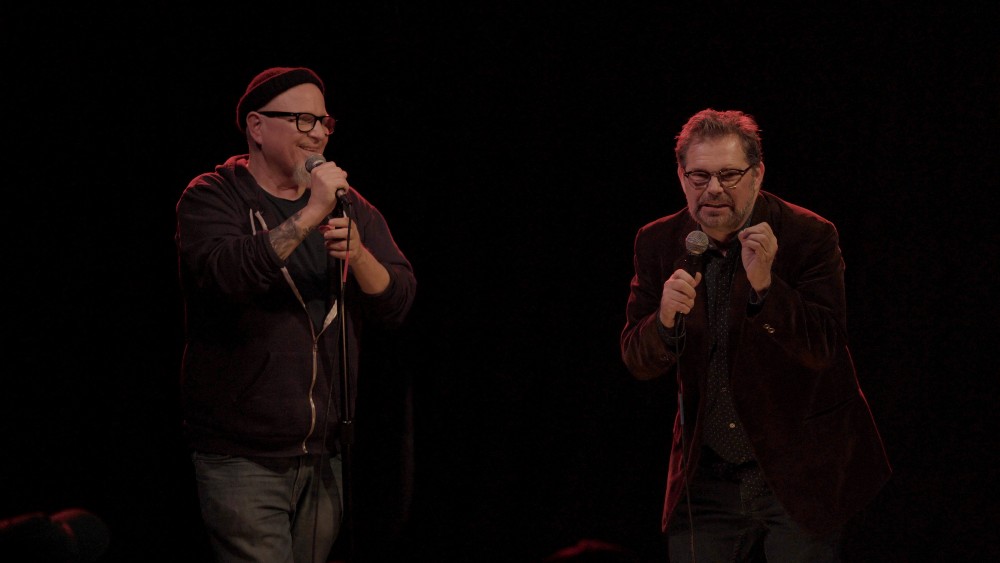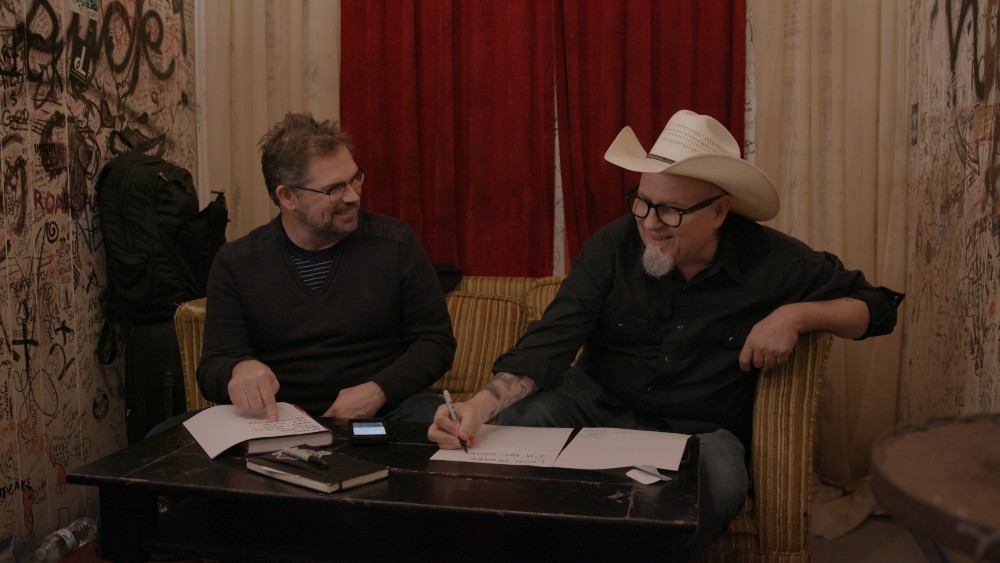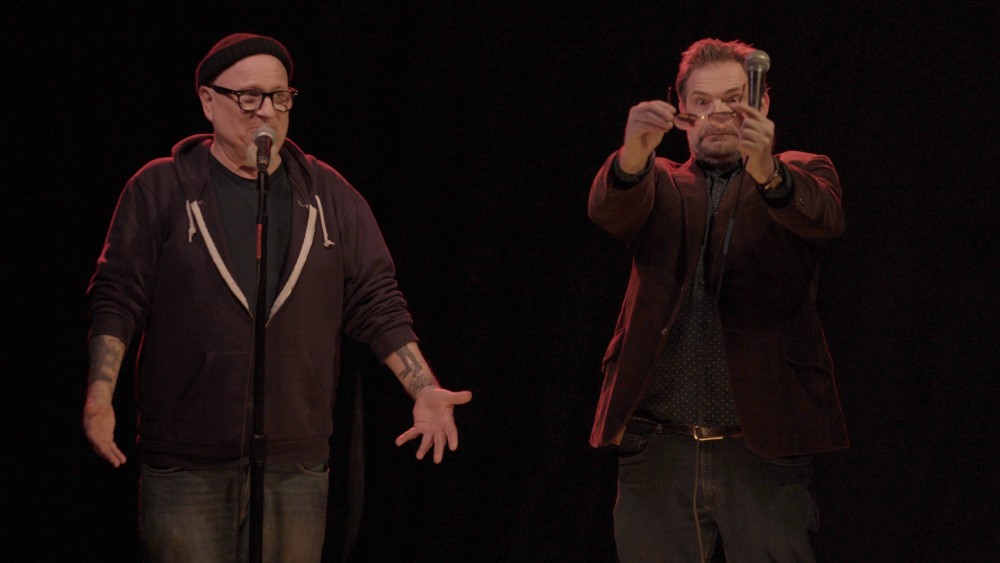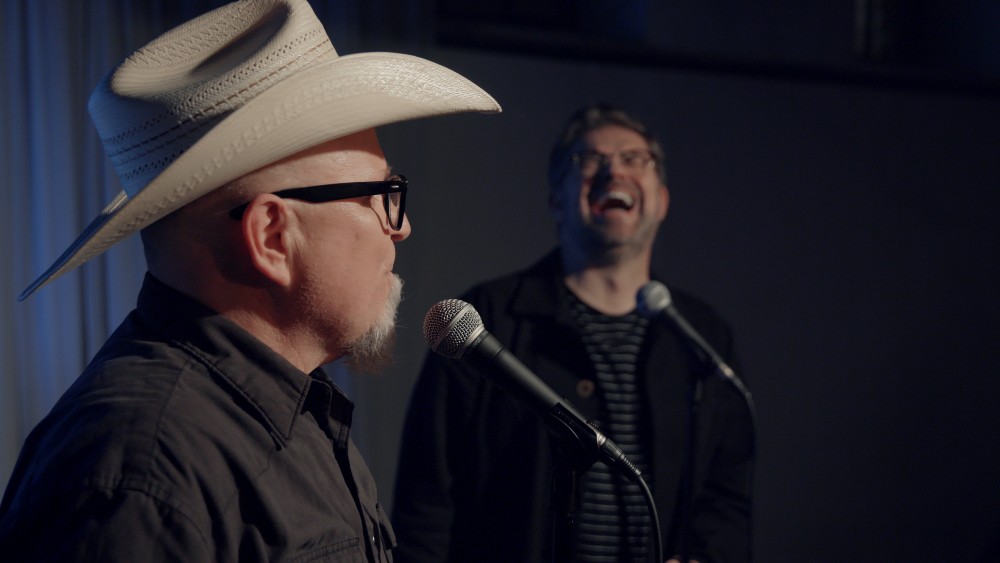
Comedians Bobcat Goldthwait (the Police Academy franchise, World’s Greatest Dad) and Dana Gould (The Simpsons, Stan Against Evil) both started their careers in Boston and came to fame doing standup in the 1980’s. It took them a bit longer to become friends, however. That friendship, along with their decades-honed comedic chops, is on full display in director Goldthwait’s new documentary Joy Ride, which opens in theaters and on demand October 29.
The film — a hybrid of comedy special, road movie and life story for the two men — opens with a real-life car accident the two were in right before taping a live show featuring the two of them performing bits and riffing with each other. That accident gave Goldthwait a perfect jumping-off point to really dig into the deepest, darkest corners of he and Gould’s lives, including the initial animosity they felt for each other. These intimate conversations from the road are intercut with archive footage and home movies, as well as their current “The Show With Two Heads!” act.
Below the Line had a chance to conduct a lively extended 2:1 chat with Gould and Goldthwait where they discuss how they overcame their revulsion for each other, pulling off such an unorthodox comedy doc, their overlapping taste in pop culture, and Goldthwait’s colorful time making a movie with George Lucas, among other things.
Below the Line: Watching Joy Ride, I got the sense that if it was just Bobcat alone on stage, or if it was just Dana monologuing to a hairy camera guy… neither would be as revealing or as funny as you two guys bouncing off each other.
Bobcat Goldthwait: I’m gonna sound like a blowhard, but there’s a reason that I put the cameras in the backseat instead of doing the normal lipstick cams and GoPros and all that crap. I did not want Dana and I performing for the cameras. There’s a little bit of that in it. Dana looks at the lens and makes a joke about diarrhea. I thought it was really important that we weren’t on for the cameras. I also wanted the viewer, hopefully, to feel like they were there in the backseat, you know?
Dana Gould: We didn’t want to do the whole, “Comedians on the road are funny all the time, playing pranks!”
Goldthwait: I also felt like there was a comfortability. I’m sure Dana felt safe, that we would sometimes discuss things that should not be in the movie. And we did discuss those. Once we were able to feel that comfortable, we ended up with what we have in the movie.
BTL: When the accident that opened the film happened, you guys were on the way to tape what was supposed to be a more straightforward comedy special with the two of you. As independent filmmakers, were there a lot of bad financial repercussions not only having to cancel several shows but also the taping, which involves, I’m guessing, crew and equipment out of your own pocket?
Goldthwait: It wasn’t self-financed, but it did cost the company that was deficiting it some money. They let us continue, but they definitely thought long and hard… “Should we just cut our losses with these numbnuts?”
Gould: We’re very, very glad they made the wrong decision and let us continue.
Goldthwait: Despite their better judgment.
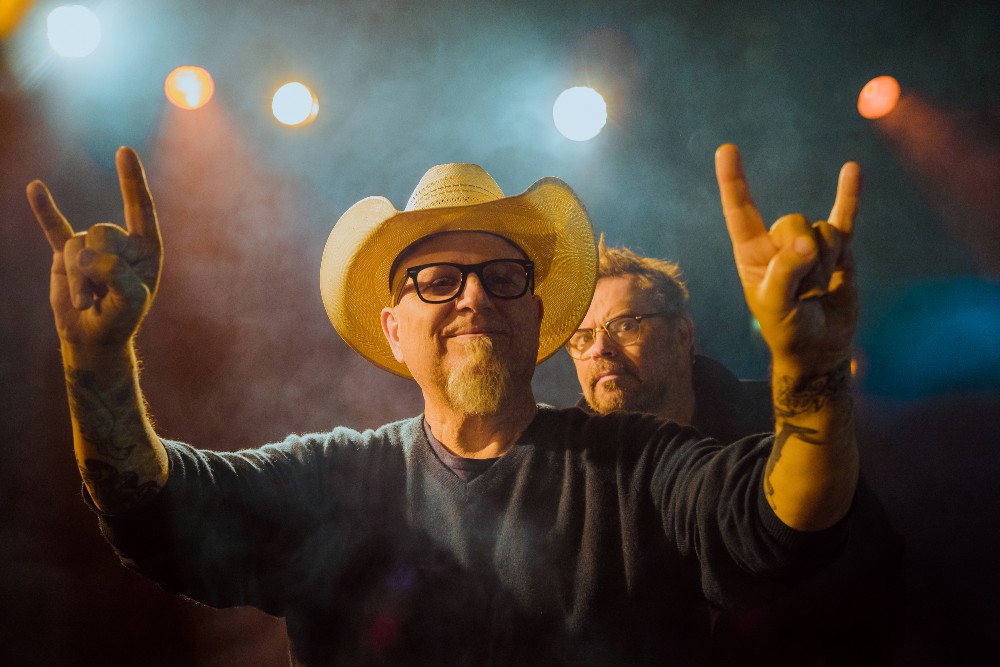
BTL: The movie is really tight, but it still feels like the perfect length. For something that attempts to encompass a spectrum of both your lives, while also being a concert movie covering multiple venues, how do you settle on roughly 70-minutes?
Goldthwait: A couple of reasons. I feel that there probably could have been another 10-minutes and I chose to lose it. I feel like there’s a fatigue that sets in when you’re watching stand-up. You could be watching the best stand-up comedian ever, but 40-minutes in you’re just out, and then you then they win you back. I hope that our movie avoids that. There’s some things that I wish I’d put in but whatever. I made a decision to jettison the persona that I do. I actually have footage of that moment, where I was backstage in Nashville, and it dawns on me that I thought I hated stand-up, but I just hated this fucking character. So I made a decision to go out in front of this audience that had paid money to see that persona, and I didn’t do it. And people were yelling up, “Do the voice!” I kind of stuck to my guns, you know?Gould: I think that goes to the nature of that persona, which was [that] he was the last guy that was supposed to be on stage. Bob’s stand-up was a parody of stand-up, which is great. Then you’re at the point where you’re doing stand-up in a persona that is parodying it. And as you have more to say the gears start to grind.
Goldthwait: Also, I could no longer surprise an audience. Tom Kenny says that’s why I started making movies. “Think you’re gonna watch a rom com… Oh, there’s a little bit of beastiality in the first five minutes.” My early standup was a little bit like, “I’m gonna dig a hole and see if I can get out of it.” I see that with a lot of the movies I make. I guess the hole that we’re digging out of in this movie is the fact that we’ve had a bumpy relationship.
BTL: It’s hinted at in the film about the friction you guys had when you both started out in Boston alongside Tom Kenny and others. What was the point when the ice melted and you two started becoming friends?
Goldthwait: Dana recalls it better and I don’t remember but I guess we were at some show and I mumbled to him, “Hey, that was pretty funny.” The thawing began.
BTL: And that thawing was happening around the mid-90’s?
Goldthwait: Yeah. I don’t think Dana changed, I think I changed.
Gould: You’re being very generous. When Bob and I first met, Bob lived in Boston and went to San Francisco and became very successful very quickly. I was 18 or 19 and moved to Boston and befriended Bob’s group of friends because we all like the same stuff. The same music, the same movies, and culturally/emotionally I was closer to 13 than 19 by nature of my upbringing and mental… I was doing the best that I could do, which didn’t say a lot for my ability. As I say in the movie, I would have hated me too. I was like a Warner Brothers character. It was a lot. Now that we’re older… I look a little too much like parts of your ID.
Goldthwait: As Mel Brooks says, “You are what you mock.” There were parts of myself that I found insufferable, and I saw them in you. I also probably never wanted to cop to the fact that you were being derivative of Tom Kenny. But the reality is I’m sure that’s my kryptonite, because I grew up beside Tom Kenny, and to say that he didn’t influence me would be insane. But I don’t want to cop to that. I wanted to think that I’m a genius.
Gould: Two things can be true! Every comedian when they start out models themselves on another comedian. Richard Pryor was Bill Cosby until he became Richard Pryor. I like to think that I took that to new Xeroxing heights. If I’d started doing stand-up comedy after I realized who I was as a person, I wouldn’t have been that ridiculous. I was trying on personalities like hats.
Goldthwait: What’s funny is I don’t think people necessarily see the Andy Kaufman, but when I was making the movie and I looked at it was like, “Oh, you’re clearly ripping off Andy.” I remember watching my second HBO special, and I’m clearly doing Robin. I’m clearly doing him. The way I’m standing and the fact that I’m climbing up into a balcony, that’s 100% Robin.
Gould: And there’s a lot of Dick Shawn in Robin. If you watch Dick Shawn perform a monologue, whether he was aware of it or not, there’s a similar theatrical stance. It’s just the nature of that particular beast.
Goldthwait: So what I’m saying is, I’m more than comfortable with the fact that the creators of Dear Evan Hanson clearly saw World’s Greatest Dad.
BTL: You should probably be happy that you didn’t have anything to do with Dear Evan Hanson.
Goldthwait: Yeah, I actually went from being slightly angry to genuinely feeling bad for the people involved. I was gonna post “World’s Greatest Dud” but I thought that was just dogpiling.
BTL: You’re both huge movie fans, particularly where Ed Wood is concerned. When you’re on the road together as depicted in the film, where do your film conversations tend to go? Where do you overlap and not overlap?
Goldthwait: The Venn diagram is Ed Wood, yeah. I think we have a lot of similar tastes.
Gould: The more arcane and forgotten it is the more I tend to be interested in it. Scott Alexander and Larry Karazsewski have said people will always come to them with ideas for biopics like, “Why don’t you do the real biopic of so and so?” And it’s like, “No, we wanted to do biopics of people that didn’t get the attention. I don’t want to do Patton or Elvis or Muhammad Ali, I want to do Ed Wood and Bob Crane.” I like the more obscure weird stuff, pretty unapologetically.
Goldthwait: I’ve made eight movies, and I’ve directed a lot of people’s specials and worked on a lot of people’s shows, but I don’t consider myself a cinephile. I probably know a little bit more [about] the art house-y kind of things just by the circles I travel in. I cannot tell you all of Truffaut’s catalogue. I haven’t seen every Jacques Tati film.
BTL: I think there’s only five of them.
Goldthwait: Oh, good. You just told me a lot about yourself. I do know what I am, and that is a storyteller. Which sounds pretentious, but I am a storyteller on stage. I tell long stories. That’s why I like making movies, because I get to tell stories. That’s what I’m passionate about. I don’t necessarily go down a rabbit hole and know every obscure title and things like that. It’s like, do you want to make movies, or do you want to make your version of other people’s movies? I remember a Terry Gilliam interview where he was telling filmmakers to study film is the worst thing you could do. You should study art, you should study anything else, just so you have something to talk about.
BTL: Dana, unlike a lot of comedians who do their material then scrap it and move on to all-new material for the next special, you will port over a bit or two from the previous special, but it will always be different, usually improved. You see that in Joy Ride with the bit about chimp attack protocol where you add this great little Mr. Rogers addendum. How do you decide when you want to take a mulligan on a bit?
Gould: You are correct. I wouldn’t do that if I hadn’t seen George Carlin do it. He improved bits and carried them over. As a fan of George Carlin I was very excited to hear that, because when you go to see him you want to hear stuff that you love. Maybe that’s not true anymore, but I know specifically that George Carlin was the concert-level comedian that I paid to see the most. If he was going into a bit that I knew I was not like, “Oh my god.” I was like, “Oh, this is great.”
Goldthwait: And then you couldn’t mouth along because he had switched it up. Someone can be on YouTube and discover someone they never heard of and watch their entire body of work in one night. I’m always changing things up, but I do bits I’ve done before. I feel like this new idea that a new hour is… There never would have been a “Who’s On First?” in this day and age because they never would have gotten it tight and polished. “Bud, we gotta cut that out of the act!”
Gould: Bits are like buildings in Los Angeles. “We’ve already seen that building before, tear it down!”
BTL: It’s funny you brought up Abbott and Costello, Bobcat. Speaking of old time radio, it’s pretty much a career asterisk for George Lucas but Radioland Murders was at the time a proving ground for a lot of emerging technology at ILM, like digital sets. What can you tell me about your time working on that film?
Goldthwait: I remember Fred Roos coming to the set and giving me a lecture about how I’ve got to dial it down a little bit because the local authorities were getting calls about me. Stone cold sober, by the way. The movie probably had a lot of faults, but when you have me just playing #17 on the call sheet, I’m going to get into a lot of hijinks. I’d be throwing parties with go-go dancers and a gospel choir opening up, with a tattooist and everybody woke up with tattoos the next day. It’s Mel Smith who directed that, right?
BTL: Yes.
Goldthwait: Mel says to me one day, he goes, “Bobcat, you smoke cigars?” I go, “Yeah.” He goes, “You should try one of mine. They’re Cuban.” I was like, “These are your cigars, Mel.” He thought the camera department had been stealing his cigars. No, every day I’d go and take a couple out of his stash. It was strange because… and maybe this is the way Lucas works, but there were a lot of shooting things that were not in a scene. Just a close up and you’re reacting and you’re not sure what you’re reacting to. Things like that.
Gould: Which is the most. Exhausting. Activity. On Earth. Just standing in front of a greenscreen… “Now you’re dancing. Now you’re really happy. Now you’re afraid.”
Goldthwait: Daryl Sabara, who had been in the Spy Kids movies, was in World’s Greatest Dad. One day, Robin had a conflict, so he wasn’t going to be there for Daryl’s side of the scene. I go, “Is it okay if I read Robin’s parts?” Daryl goes, “Uh, Bobcat, I did three movies talking to a green tennis ball. I’m fine if Robin’s not on the set.”
BTL: Dana, over the years on your podcast the historical segments have become a bigger and bigger part of the mix. Now you’re doing Weird Cinema Studies 101 stuff in your Cinemorph newsletter and you’re appearing as a talking head on Kino Lorber’s Kolchak Blu-ray. At what point did you realize you were becoming something of an entertainment historian?
Gould: I never did, it just grew like a mushroom. The middle part of the podcast was the start of it, and that came from Bob Dylan’s Theme Time Radio Hour on Sirius where Dylan would talk for 45 seconds about the band on the Titanic or Sammy Cahn or something. I love the fact that things just happen and they fall into place and it’s all accidents and nothing is planned. Jaws is a better movie because they didn’t test the shark in saltwater. Because of that fuckup they were forced to improvise and it became a better movie. I just find those stories really fascinating and they’re self-assuring because your own career never goes as planned. With the things that I’m doing there’s always adversity, there’s always something and you just keep going. As a fan people just started calling me. I’m also on the Criterion The Incredible Shrinking Man DVD talking to Joe Dante about that movie. They call me and I go, “Sure, I’ll do it!” Usually I’m waiting for my daughter to finish ballet, or if not I’m available.
Goldthwait: All these things he’s talking about and that he’s passionate about like Kolchak and Incredible Shrinking Man and Planet of the Apes, all those things were a game changer for me as a kid. The difference is Dana… is still watching it. No, the difference is Dana thinks it’s real.
Gould: (fake crying) “It is real! It’s real to me!”
Goldthwait: I don’t know if it’s our age or what, but so many of those things that we have a passion for are from a very specific time. Although he’s younger than me, it’s a very specific time.
Gould: I remember after I was divorced I was living close to my ex-wife, and we have a very good relationship for which I’m very grateful. I stopped by the house on the way home and the babysitter is there. I was like, “Oh, where is she?” She’s like, “Oh, she’s out at a thing.” I was like, “Alright you can go home and I’ll stay,” because I wanted to say goodnight to my kids. So I say goodnight to my kids, and then I go down and I turn on the TV. I’m flipping the channels and Star Trek was on because my settings were still on for what was recorded. So I just started watching it, and she came in and just looked at me and looked at the TV and looked at me. It’s like, “You’re the same exact person I met in 1994.” But I was like, “Yes! That’s the point!” That’s a feature, not a bug.
BTL: The psychological part is those things that we love take us to a safe place. They’re anxiety-soothers.
Gould: I can only speak for myself, but Bob and I both grew up in chaos. Things that gave you a sense of stability and comfort get imprinted with a lot of resonance. The thing that made Star Trek, the original series, so important to me is not my grand love of science fiction. It’s the fact that it was on at six and it was always on at six and I could depend on it. It wasn’t gonna get drunk and not show up, or I didn’t know what mood it was gonna be in. At six o’clock on channel 56 it was on.
BTL: Planet of the Apes was a standup dad.
Gould: Yeah!
BTL: Bobcat, can you tell us the status of your Call Me Lucky feature for Judd Apatow, based on your documentary?
Goldthwait: I’ve been developing it with Judd.
Gould: It’s been changed to “Call Me Pending.”
Goldthwait: Barry used to call it “Call Me Greedy.” It’s a very long script at this point, and it’s hard — especially during the pandemic — to work on a story about a mentor/friend/pain in my ass who passed away, who means so much to so many people, and the movie’s about his rape as a kid and him coming through the other side. It’s been hard to work on that during these times. I am finishing it and working on a few things that I owe people, but things are so dark. I actually wrote another script, my version of an 80’s kids movie, but it feels a lot like Miracle on 34th Street too. I wrote a hopeful movie, and it’s really about the kid I was at seven and that idea that anything is possible. It was the thing that gave me a lot of hope during how dark things have been. So I was editing Joy Ride, and then I would go work on that screenplay. When I was a kid I couldn’t stop lying. I always lied. There’s a line in the movie where this character — who could be a crazy homeless person or a person from outer space, we don’t know — he says to the kid, “Why do you lie?” And the kid says, “Because I lie all the time, and I wish I didn’t lie all the time.” And he says, “Write it down, then you’ll be a writer, you won’t be a liar.” The challenge was could I write a hopeful movie? Without cynicism and sarcasm, and without that thing in the movie, that’s so shocking I’m daring you to watch the rest of the movie. Every time I pull the trigger on a movie there’s always a question of, “Can I do this?” That’s what interests me. On Joy Ride it was like, “Can I be honest with Dana and can I form a narrative?” Can I make this something other than just an indulgent exercise?
BTL: I think you absolutely did. It transcends the stand-up special genre, it transcends the road movie. It’s a cool hybrid.
Gould: I say this: It’s Bob’s movie, I’m just in it. When I watched it, aside from being critical of myself, it was very rewarding to see that. What he managed to do was impose a narrative structure on pre-existing events. It’s not like he wrote it ahead of time. He got all the stuff and he made this out of these found ingredients. That was what I was really impressed with. There is an absolutely clear narrative. Unfortunately Bob, as he will tell you, had to make himself the villain of the piece.
Joy Ride is now playing in select theaters and available on demand. All photos courtesy Gravitas Ventures.

